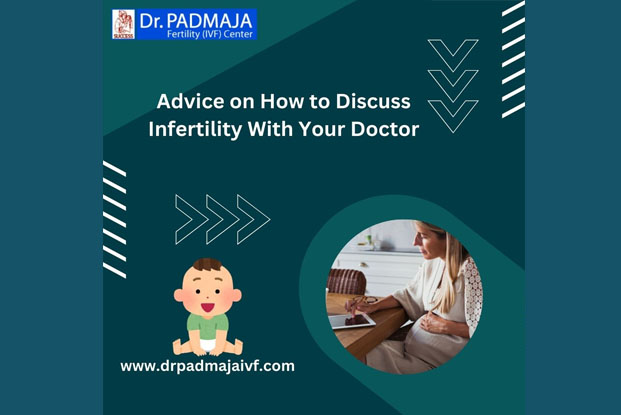Managing infertility can be a challenging and painful journey for some couples. If you find yourself navigating this path, open and honest communication with your doctor is essential. Discussing infertility with a healthcare professional can feel overwhelming, but it doesn’t have to be. Here are some tips to help you have a productive conversation about your fertility concerns, particularly if you’re considering visiting the best IVF center in Hyderabad, such as Dr. Padmaja IVF Center.
1.Prepare Your Medical History
Before your appointment, gather all relevant medical records. This includes information about your menstrual cycle, any previous pregnancies, surgeries, and medical conditions. If you’ve undergone any treatments, such as fertility medications or previous IVF cycles, make sure to include those details as well. Having this information at hand can help your doctor understand your situation better and tailor their advice accordingly.
2. List Your Symptoms and Concerns
Make a list of any symptoms you’re experiencing, such as irregular periods, pain, or hormonal changes. Also, write down any specific concerns you have regarding infertility. This list will serve as a roadmap for your conversation and ensure that you don’t forget to address important issues during your appointment. The clearer you are about your concerns, the better your doctor can assist you.
3. Be Honest About Your Lifestyle
Discussing your lifestyle choices with your doctor is crucial. Factors such as diet, exercise, alcohol consumption, and smoking can all impact fertility. If you’re visiting a reputable facility like the Dr. Padmaja Fertility Center, expect a non-judgmental approach. Your doctor is there to help you, and being open about your lifestyle will allow them to provide tailored advice.
4. Understand the Testing Process
Your doctor may recommend a variety of tests to determine the underlying causes of infertility. These could include blood tests, ultrasounds, or sperm analysis. Understanding these tests can ease your anxiety and help you prepare for the next steps. If you’re considering IVF, the team at Dr. Padmaja IVF Center can guide you through the necessary evaluations to make informed decisions.
5. Discuss Treatment Options
Once you have a diagnosis, your doctor will discuss potential treatment options. This is a good time to ask about the pros and cons of each approach, including medication, surgery, or assisted reproductive technologies like IVF. If IVF is recommended, ask about the process, costs, and what to expect at a facility like the Drpadmaja Fertility Center.
6. Talk About Emotional Well-being
Infertility can take a toll on your emotional health. It’s important to discuss any feelings of anxiety, depression, or isolation with your doctor. They can provide resources or referrals to counseling services. Many clinics, including the best IVF center in Hyderabad, understand the emotional challenges of infertility and may offer support services.
7. Consider a Support System
Before your appointment, consider bringing a partner or a close friend for support. Having someone else with you can help you remember important information and provide emotional support during what can be a stressful discussion. They can also help ask questions you might not think of in the moment.
8. Follow Up
After your initial conversation, don’t hesitate to reach out with any additional questions or concerns. Many fertility centers, including Dr. Padmaja IVF Center, encourage open communication. You can also schedule follow-up appointments to discuss your progress or any new symptoms.
9. Know When to Seek a Specialist
If your primary care doctor is unable to provide the answers or treatment options you need, don’t hesitate to seek out a specialist in infertility. Facilities like the Drpadmaja Fertility Center offer expertise in managing complex cases and provide a range of advanced treatments.
Conclusion
Discussing infertility with your doctor is a critical step in your journey toward parenthood. Being prepared, asking the right questions, and understanding your options can empower you to take control of your fertility journey. Remember, you’re not alone in this process, and the best IVF center in Hyderabad is there to support you every step of the way. By fostering open communication with your healthcare team, you’ll be better equipped to navigate the challenges ahead.
About The Author :

If Dr. Padmaja Divakar is a public figure or a professional in a specific field, I recommend checking her official website, professional profiles, or reliable online sources for the most up-to-date and accurate information about her background, qualifications, and achievements.
Frequently Asked Questions (faqs)
What are the early signs of infertility in young women?
Early signs of infertility may include irregular periods, heavy or very light menstrual flow, absence of periods (amenorrhea), or spotting between cycles. These can signal potential issues with ovulation, which is a key factor in fertility.
Can hormonal imbalances cause infertility?
Yes, hormonal imbalances can significantly affect fertility. Conditions like Polycystic Ovary Syndrome (PCOS), thyroid issues, or excessive production of prolactin can interfere with ovulation and lead to infertility.
Is age a factor for infertility in young women?
Though fertility naturally declines with age, some young women may experience infertility due to underlying conditions. Even women in their 20s can face challenges if they have issues like endometriosis, premature ovarian failure, or other reproductive health conditions.
What role does weight play in fertility?
Both being underweight or overweight can impact fertility. A healthy Body Mass Index (BMI) is important for regular ovulation and overall reproductive health. Extreme fluctuations in weight can also disrupt menstrual cycles.

